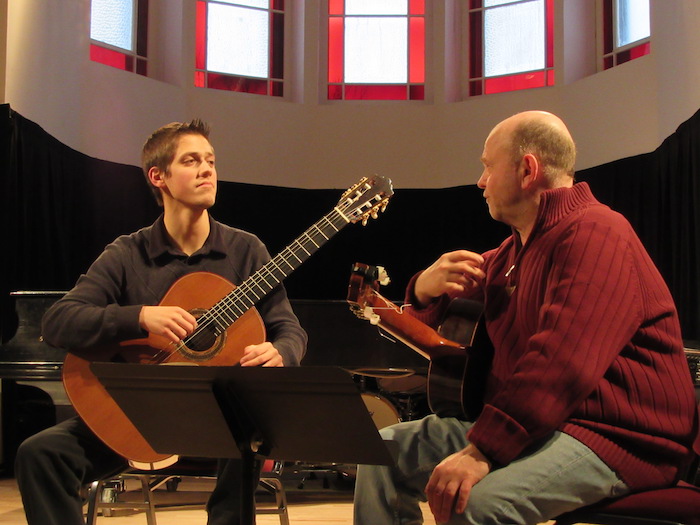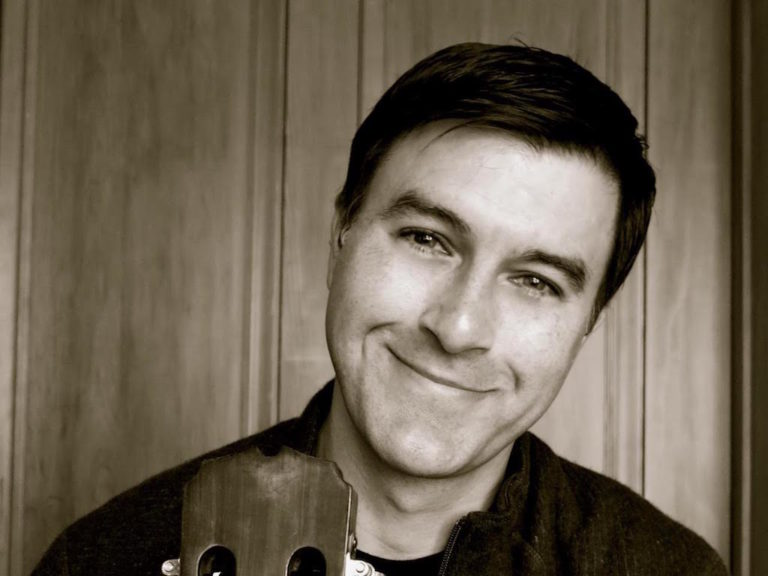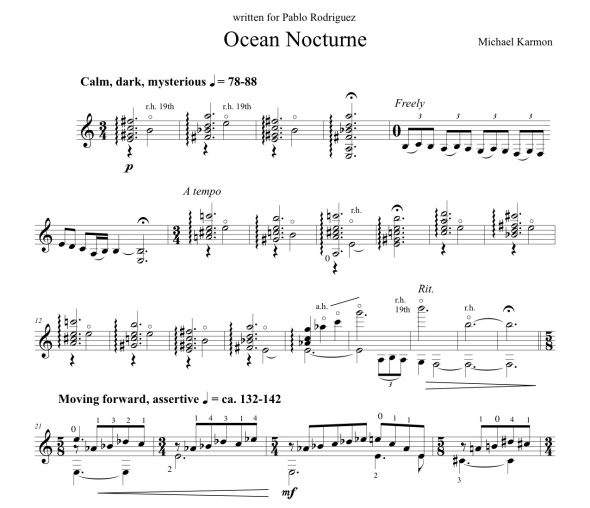This is a guest post by composer Michael Karmon
Previously posted on Classical Guitar Canada
It is truly wonderful that so many classical guitarists feel compelled to write for their instrument. Composing is often a rewarding and enjoyable experience, and it can give you a deeper understanding of what other composers are doing. But with the guitar, more than with other instruments, there’s a danger of relying on familiar finger patterns and common sounds. So here are a few ideas that will keep your fingers from doing the composing for you.
Follow the line
In most kinds of music the individual line is of supreme importance. The top line naturally gets a lot of attention, but the bass line is also quite important and should be made to sound distinctive. Try to have a nice mix of stepwise and leaping motion. And adding some rhythmic variety, even just a little bit, can really go a long way. Guitar music also has internal (and often fragmented) lines, and these can be a little tricky. But shape, logic, and appeal in the inner lines can give your music extra depth and interest.
Keep an eye on voice leading
If you have a change in harmony that seems weak or strange take a look at how each voice moves from one chord to the next. In general, stepwise motion will give you a smoother sound, and having some voices go up while others go down will make the harmony change sound fuller and more satisfying. (Keep in mind that guitar music can have some pretty strange voice leading. This is just a fact of life.)
Write it down
Some guitarists like to compose the entire piece, often with guitar in hand, and then write it down when it’s finished. I believe this is a mistake. Writing down the music as part of the composing process gives you a new and valuable perspective. Patterns, repetitions, weak textures, poor voice leading, and other details and possibilities can really leap off the written page. The simple act of writing down the music, either by hand or on your computer, is an important and powerful compositional tool.
Bang it out on the piano
Even if you’re a poor pianist, as I am, you should try to play your piece on the piano. It’s a wonderful and intuitive composing instrument, and through it you can glimpse musical ideas and solutions that would never occur to you otherwise. Like writing down the music, playing it on the piano gives you yet another fresh perspective on your music. And problems that are hidden by the guitar’s beautiful warm tone often become readily apparent with the more brittle piano.
Put down your guitar
Walk away from your instrument and run through the piece in your mind. Slow it down, speed it up, add to it, make it louder or softer, and so on. It’s quite difficult to really focus and critique the music while you’re playing it. Putting your guitar aside and only thinking about the music often clarifies things and, again, give you a fresh perspective. In the end, your musical imagination is your most important tool. Be sure to make full use of it.
Give it time
More than anything else, composing is a function of time. You just have to let it unfold at its own pace. So don’t rush it, enjoy the process, don’t stress out, and in the end you might just have a nice new piece of music on your hands.
Michael Karmon
www.michaelkarmon.com
About me
The classical guitar is featured in all my recent music, and I’ve written for some very fine players, among them Martha Masters, Denis Azabagic, Joe Hagedorn, Michael Partington, Daniel Bolshoy, Newman and Oltman Guitar Duo, and Duo46. I’ve won various awards and fellowships, and my music continues to be performed around the world. It is recorded on the MSR, Cedille, and Brioso labels.
I was born in the US in 1969, but I spent my formative years in Israel and returned here in 1986. I’ve performed extensively as a guitarist in several styles and with a variety of ensembles, but I now compose exclusively. I have a doctorate in composition/music-theory from the University of Minnesota, and now live in California with my wife and twin sons.
Recent works for guitar
Here are a few recent solo pieces, with links to my site where you can listen and download a free copy of the score.
Rain, Next Year, Backpack Pieces, Songbook, The Guitarist’s Guide to the Orchestra, Six of One, Half a Dozen of the Other





Great Info! Beautifully said!
Thanks for the comment Carlos. Really like your Whirler of the Dance work and other compositions.
thank you for the comment on Whirler! (somehow just saw this now???) best wishes in the new year!
Thanks for the comment Carlos. Really like your Whirler of the Dance work and other compositions.